Steve Bannon, cheering trade war, hopes for government to fall — in China
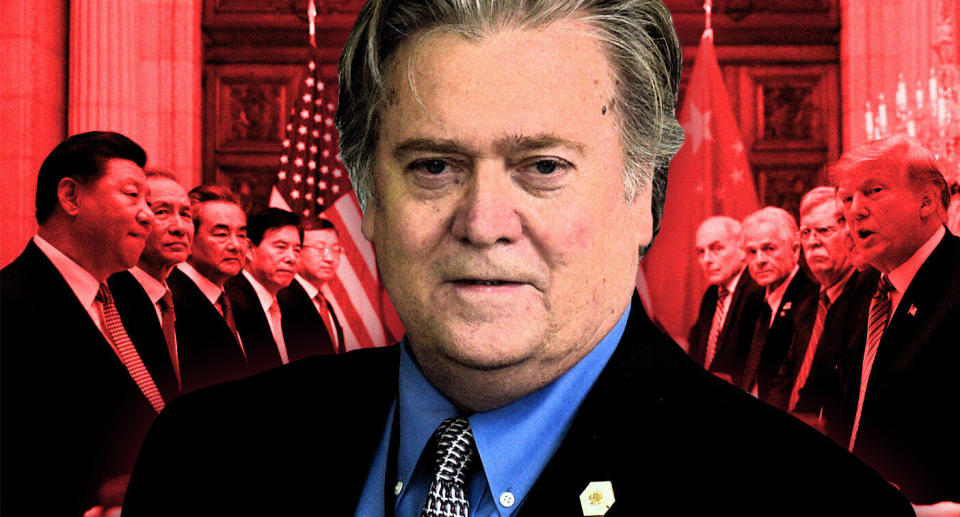
BARCELONA, Spain — Forget Iran. The Venezuela crisis is for amateurs. When White House adviser in exile Steve Bannon embarks on regime change, he goes straight for the biggest, and, he maintains, the most dangerous one on Earth. That would be the one in Beijing.
Drawing on his background as a businessman and naval officer with experience in China, and in cooperation with an dissident Chinese billionaire expat, Bannon is beating the drum about the grave threat the country poses to the United States — economically, technologically, and geopolitically. As the tariff war sends Wall Street into a tailspin, Bannon is warning that the current trade imbroglio is just the latest battle in an “information and economic war” that’s been going on for 20 years, aiming “to render America a second-rate economic power.” He says China’s plan to supplant the United States is laid out in “Unrestricted Warfare,” a book penned by two Chinese Army colonels and first published in 1999. He carries it with him wherever he goes.
Bannon believes that China presents “the greatest existential danger” ever to the U.S. “because we have never faced an opponent with the scale and ambitions of the leadership of the [the Chinese Communist Party]” — now headed by President Xi. Bannon has formed an alliance with Chinese real estate mogul turned whistleblower Miles Kwok, now living in New York and reportedly on China’s most-wanted list, to help alert the Chinese people and the world to what they both believe are the misdeeds of the Beijing regime as it tries to become the “economic hegemon” of the planet.
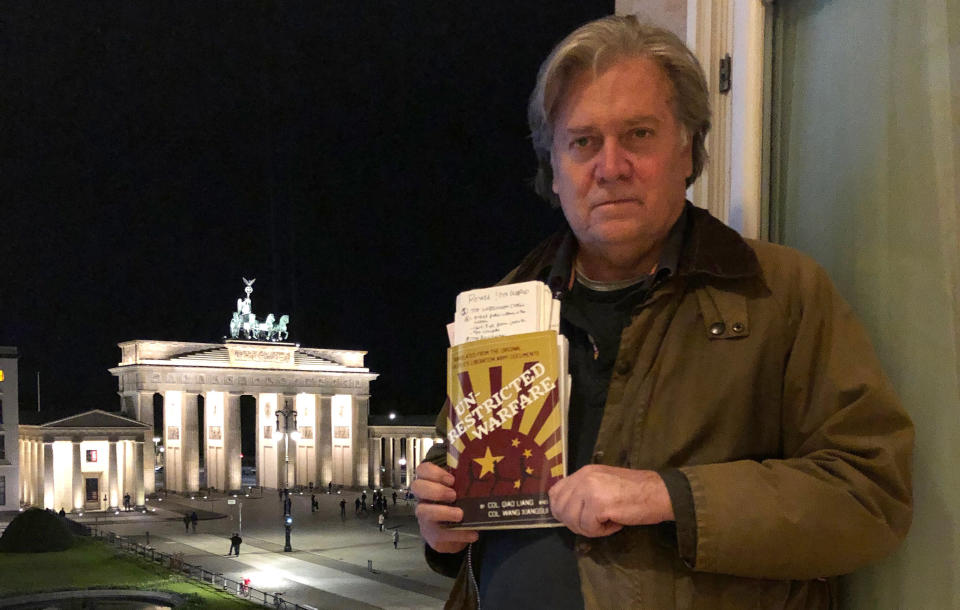
Apparently not “receiving the memo” that he’d been dismissed from relevance after being ejected from the White House in August 2017 and booted from Breitbart soon after, Bannon has embarked on a mind-boggling global effort to advance his agenda on economic, political, cultural and religious fronts. He is involved in the effort to raise private money to build a wall on the border with Mexico, while establishing an academy in Italy to train Judeo-Christian “gladiator” culture warriors, launching a working group of prominent American Catholics to assess the church’s financial situation after massive payouts to victims of clerical child abuse, and strategizing with nationalist-populist European parties for the upcoming European Parliament elections. But one of the projects nearest to Bannon’s heart is the Committee on the Present Danger: China, which he founded with neocon Islamophobe Frank Gaffney to “educate and inform American citizens and policymakers” about China’s “increasingly brazen, blatant, and aggressive behavior” and its use of “an array of asymmetric financial, economic, cyber, information, influence, espionage, [and] political warfare … to weaken and ultimately defeat America.”
Bannon also recently became director of the Rule of Law Fund started last fall by Kwok, also known as Guo Wengui, who fled to the U.S. in 2015 and is now seeking political asylum. (He is already a member of Trump’s Mar-a-Lago club.) Kwok was party last year to a staggeringly complex and monumentally inconsequential web of defamation lawsuits involving former Trump confidantes Roger Stone and Sam Nunberg, another Chinese businessman named Bruno Wu and Alex Jones’s website Infowars. While busy fending off what he describes as assassination plots and Chinese security forces trying to return him to Asia, Kwok runs Guo Media, posting controversial videos that allege high-level corruption in China.
Kwok started the Rule of Law Fund with $100 million to support investigations into corruption, whistleblowers and victims of Chinese political repression. As the New York Times noted, he “has exposed a phenomenal web of corruption in China’s ruling elite — if, that is, he’s telling the truth.” He hopes that bringing these alleged misdeeds to light will result in the fall of the country’s ruling Communist Party.
Bannon — who says he receives no salary or other compensation from Kwok’s foundation — shares that goal. One method they think can achieve it is to get information directly to the Chinese people, whom Bannon says he admires, calling them “the salt of the earth — hardworking, decent, family-oriented.” He believes they’ve been effectively enslaved by Beijing.
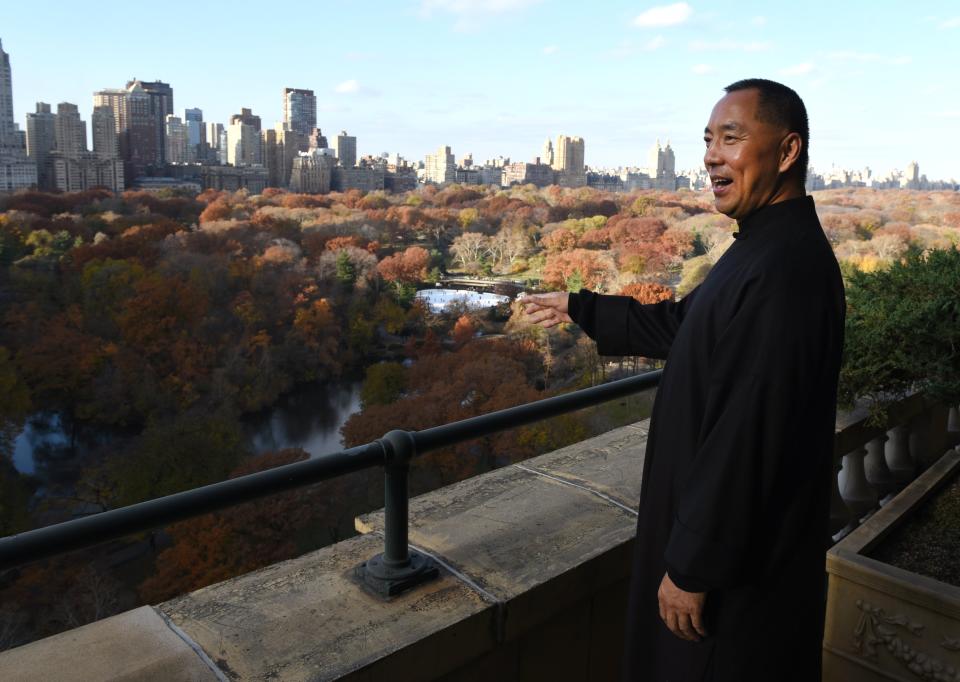
Bannon has been warning about the rise of the sleeping dragon since 2008, when, as a businessman in Shanghai, he attended the Olympics in Beijing, which kicked off with a four-hour long extravaganza of gravity-defying acrobatics, dances by 15,000 performers, and fireworks that so dazzled the world that the AFP called it the “greatest ever.”
“The opening ceremony was so epic, so vast in scale and deep in history,” recalls Bannon, “that I knew the West had a real problem on its hands.” It spoke to the richness not only of China’s “4000-year history” and “deep culture,” but illustrated “massive ambition on a global scale.” Like Kwok, Bannon believes that that ambition has been harnessed and hijacked by President Xi Jinping and “a radical cadre” within the Communist Party, which with 90 million members is one of the largest parties in the world but a small minority of the Chinese population. As Bannon points out, “1.3 billion of China’s 1.4 billion population aren’t Communist.”
In 2014, when the Obama administration did not object to China’s construction of artificial islands in the South China Sea — which Bannon describes as stationary aircraft carriers, an assessment largely shared by the Department of Defense — Bannon called American acquiescence “the Munich [agreement] of the 21st century.” He believes these faux isles could trigger a “shooting war” with the United States if the island-building continues.
It’s not just China’s expanding military presence — as of last year it has a real aircraft carrier as well, and several under construction — that alarms Bannon.
As outlined in Frontline’s “Trump’s Trade War,” a program that aired last week for which Bannon was interviewed, China engages in dodgy economic and trade practices, including heavy subsidies for industry, currency manipulation to promote exports, ignoring copyrights, cyberattacks and corporate espionage, and forcing U.S. companies that are doing business in China to share their intellectual property with the Chinese.
“China's state capitalist system is designed specifically to exploit the Western democracies — to both steal and force technology transfers,” says Bannon. Of particular concern: Chinese telecom company Huawei, which Bannon and Kwok believe is a front for Chinese military and is underbidding in contracts worldwide to set up next-generation 5G wireless technology. Bannon says it will be able to “weaponize data,” turning it into “plutonium” wherever it sets up.
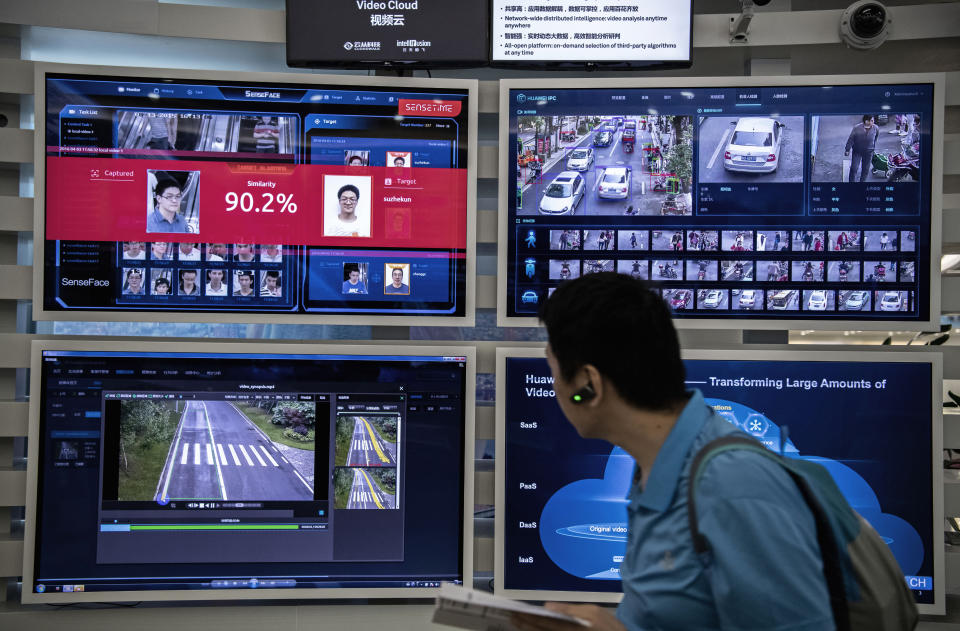
Last week Secretary of State Mike Pompeo publicly warned on British Sky TV that the U.S. might be obligated to stop sharing intel with Britain if they use Huawei to build 5G networks — a position Washington has been pushing on allies worldwide for months. “We certainly will never put America’s national security secrets in a network that we don’t have confidence in,” Pompeo said. According to the Defense Department’s “Annual Report to Congress: Military and Security Developments Involving the People’s Republic of China 2019,” released just last week, if Huawei dominates 5G globally, it will “challenge the security and resiliency of other countries’ networks.”
Another concern: Made in China 2025, a program to make the nation the leading force in advanced chip design, artificial intelligence, electric cars and robotics, which Bannon believes will give that country vast control of high-value manufacturing in the world. The Defense Department report says plans for Made in China 2025 “present an economic challenge to nations that export high-tech products” — namely, the United States.
Now, in addition to pushing for balancing trade and ending China’s unfair business practices, Bannon is pushing for political change and the establishment of rule of law in China, especially since connecting with Kwok, who’s stated that he’s “anti-CCP” — Chinese Communist Party — and, like Bannon, wants “to take this regime down.”
The two met in October 2017, shortly after Bannon left the White House and Kwok was interviewed on Voice of America—a planned 3-hour interview with that was cut short after an hour, when executives apparently grew concerned about Kwok’s “nuclear-grade” allegations about shady deals of China’s corruption czar Wang Qishan, whose investigations in 2014 first prompted Kwok to flee, when the businessman learned one of his allies in the government was facing arrest. (Wang, now China’s vice president, resigned from the anti-corruption post.) Kwok said pressure from the Chinese government caused the broadcaster to pull the plug, though VOA, which fired three reporters and suspended others over the interview, denied that. When Kwok was scheduled to speak at the Hudson Institute shortly thereafter, the think tank’s site experienced a cyberattack from Shanghai, and the event was canceled. According to the Wall Street Journal, “Kenneth Weinstein, the Institute’s president, said Beijing ‘sought to dissuade’ it from holding the event but said the change of plans was caused by poor planning, not Chinese pressure.” The Journal also reported that Beijing sent a demand to Trump — delivered by Steve Wynn, who owns a casino in China-controlled Macau — to arrest Kwok and extradite him to China. (Wynn has denied being the bearer of the letter.) According to the Washington Times, then Attorney General Jeff Sessions threatened to resign if the plan was carried out.
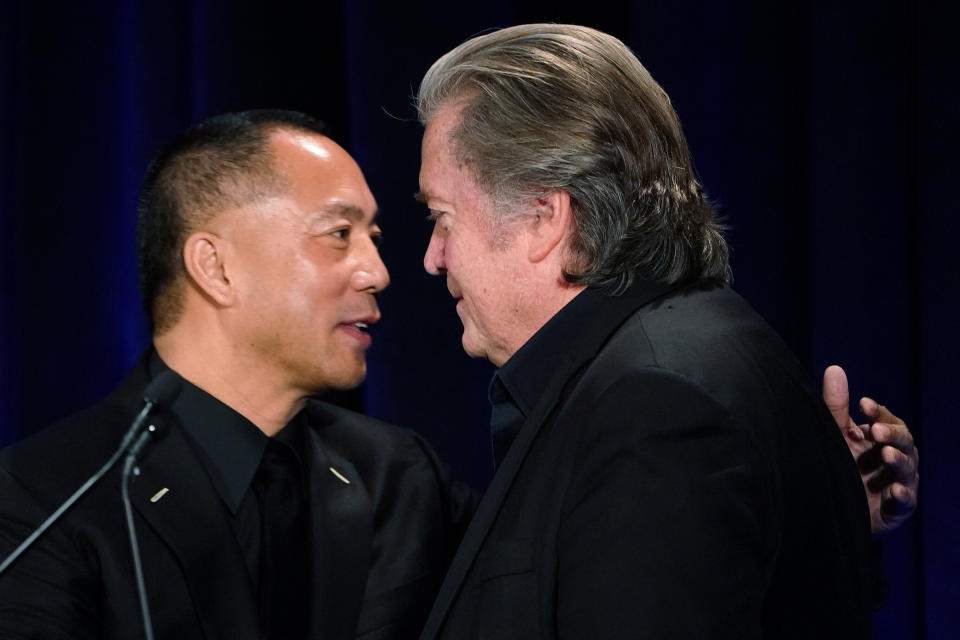
Last November, Bannon and Kwok announced the creation of the Rule of Law Fund at the Pierre hotel in Manhattan, where Bannon introduced Kwok, noting that “literally hundreds if not thousands of the best and brightest of the Chinese people” were missing, imprisoned, had died under mysterious circumstances or had their assets seized and were impoverished by the Chinese government. “That ends today,” he intoned. “It ends because one man is prepared to stand up and say he’s not prepared to tolerate this and he will use every asset at his disposal to bring truth to this and make sure the Chinese people don’t come under any more assault from the Chinese Communist Party…”
Kwok believes the Chinese government is trying to kill or abduct him from his Manhattan penthouse.
The pair now do weekly podcasts about Chinese politics, live streaming it into China, going around the government’s firewall.
They did an unscheduled broadcast earlier this month after President Trump threatened new tariffs to punish China for attempting to renegotiate its trade deal with the U.S. They celebrated with cigars.
Until then, negotiations between Team Trump and Team Xi, as captured in an approximately 150-page trade agreement draft that the two countries had been working on for months, appeared fairly rosy — with global stock markets rising on the assumption that a deal would be struck. Treasury Secretary Steve Mnuchin even announced on April 28 that they were on the “final laps.”
Bannon regards Mnuchin’s comment as a huge “strategic miscalculation that signaled to the Chinese that the Americans needed a deal.” Bannon also says, based on information from China, that Xi “was surprised by the number of countries” that showed up in late April for the three-day forum on China’s controversial “One Belt, One Road” infrastructure program that Putin praised. Xi was also elated by “the reception they got, especially by Russia” and three dozen other countries whose leaders signed deals for $64 billion of Chinese-backed infrastructure projects.
That response, he says, emboldened China, signaling to Xi that their current system is working and there was no need to sign what they saw as “essentially a surrender document” with the U.S. to change that very system.
“They never believed an American president would stand up to them,” says Bannon, referring to Trump’s threat-by-tweet strategy. The previous three administrations, he says, have all “cratered” in similar situations with Beijing. He believes that China will now “try to run out the clock — get as limited a deal as possible and hope they can get around Trump in 2021,” although he personally believes Trump will win the next presidential election.
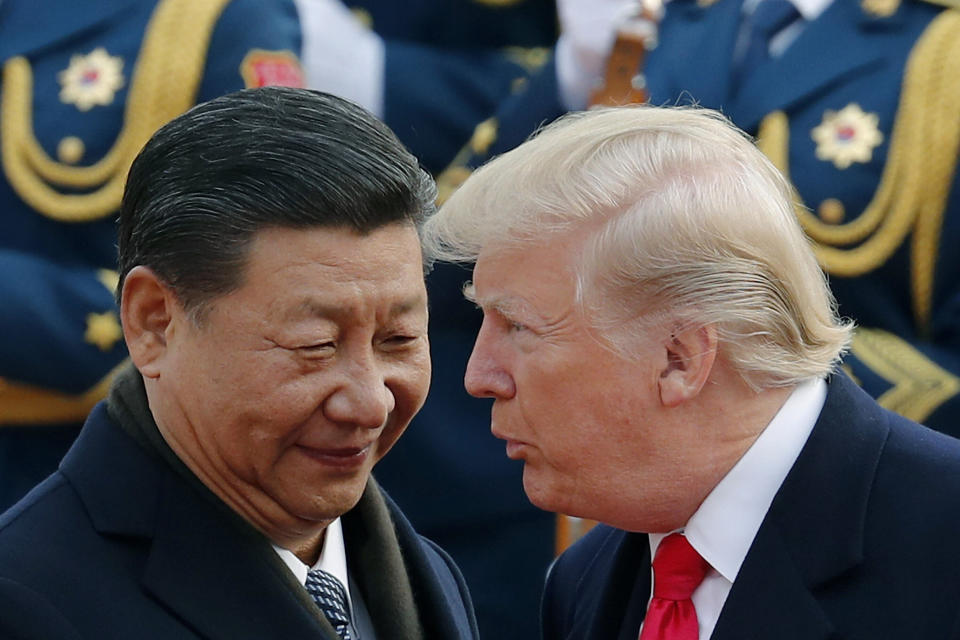
Never mind that Trump doesn’t appear to understand how tariffs work, tweeting on Friday that “Tariffs are NOW being paid to the United States by China of 25% on 250 Billion Dollars worth of goods & products. These massive payments go directly to the Treasury of the U.S.” In fact, tariffs are largely borne by U.S. importers of Chinese goods and passed on to U.S. consumers, as Fox News’ Chris Wallace felt compelled to point out on Sunday.
Tariffs were exactly what Bannon wanted — and has wanted since his days in the White House, where on occasion it nearly came to brawls between the “yes tariffs” camp, dubbed “the nationalists” — including Bannon and presidential economic adviser Peter Navarro — and the “no tariffs” camp, also known as “the globalists,” comprising chief economic adviser Gary Cohn and national security adviser H.R. McMaster. “There's no middle ground,” Bannon said on Frontline, referring to the U.S. and China and their colliding economic systems. “One side’s gonna win, one side’s gonna lose.”
And with the news that Trump was pumping up the tariff rate, Bannon kicked up a cheerleading storm, writing an op-ed for the Washington Post warning, “We’re in an economic war with China. It’s futile to compromise” in which he outlines China’s predatory, mercantile practices and predicting any trade deal would be “a temporary truce in a years-long economic and strategic war with China.” He was interviewed by Fox News Radio — urging Trump to go through with the import taxes — and appeared with one of Trump's favorite media figures on Fox Business Network, Lou Dobbs, calling Trump’s decision so crucial that it marked the most important day of his presidency.
And then, having ensured that Trump heard his message, Bannon packed up his copy of “Unrestricted Warfare” and headed off for Europe, to stir up a nationalist-populist storm there.
Melissa Rossi is an American journalist based in Western Europe.
_____
Read more from Yahoo News:

 generic
generic 
